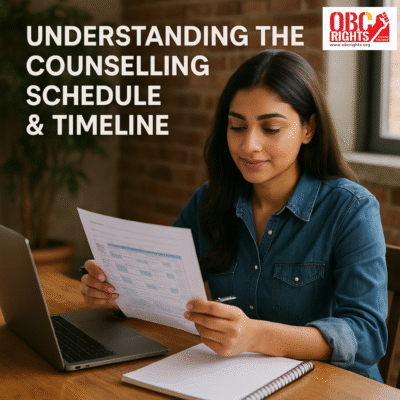Getting admission into a top government college is a dream for many students in India. After clearing competitive exams like JEE or NEET, the next important step is to understand the Counselling Schedule & Timeline. This process includes multiple rounds, deadlines, and steps, which can sometimes feel confusing or overwhelming.
That’s why we’ve created this easy guide. We will explain the counselling process in simple steps to help you understand what to expect and stay on track for IITs, NITs, medical colleges, or state universities. Here’s a simple breakdown of how it works.
1. Registration & Application
The first step is registering for counselling. Candidates must fill out an online application form, providing necessary details like academic scores, entrance exam results, and personal information. Some counselling processes, like TNEA 2025, have specific registration windows.
2. Document Verification
Once registered, candidates must upload or present their documents for verification. This ensures eligibility and authenticity. The verification process may be conducted online or at designated centers.
3. Rank List & Merit-Based Selection
The rank list is released based on the marks obtained in the qualifying examination (TNEA) or the entrance test (TANCET, NEET, JEE).
4. Choice Filling & Seat Allotment
Candidates need to fill out their preferences for colleges and courses.
5. Payment & Admission Confirmation
Once allotted a seat, candidates must pay the required fees and confirm their admission. Failure to do so within the given timeframe may result in losing the seat.
6. Additional Rounds & Waitlist
If seats remain vacant, additional rounds of counselling may be conducted. i.e., Second Counselling, Third Counselling, etc., Candidates on the waitlist may get an opportunity to secure admission.
Understanding these steps ensures a smooth admission process. Always check official websites for updated schedules and deadlines, such as e-Counselling portals
Counselling Schedule & Timeline: Key Notes
Here are some simple and effective tips to manage your counselling schedule and timeline smoothly.
Keep checking the official websites for updates, and sign up for email or SMS alerts to stay informed about important dates and announcements.
1. Stay Updated:
Keep checking the official websites for updates, and sign up for email or SMS alerts to stay informed about important dates and announcements.
2. Keep Documents Ready
Keep both scanned copies and original documents ready, and ensure that your certificates, ID proofs, and mark sheets are valid and easily accessible.
3. Understand the Process
Read the counselling instructions carefully and understand each step, like registration, document check, choice filling, seat allotment, and fee payment. Understanding your category of reservation, for example BC, MBC, SC/ST – as far as Tamil Nadu State Institutions are concerned and OBC, SC/ST, EWS – as far as All India Institutions are concerned and filling the relevant category is important.
4. Set Priorities
Make a List of your preferred colleges and courses based on your interests, and keep backup choices ready in case the top ones aren’t available.
5. Monitor Deadlines
Use reminders to track key dates like document submission, choice locking, and fee payments. Missing deadlines can result in seat cancellation.
6. Be Quick & Decisive
When seat allotment begins, make decisions promptly. Delaying choices could reduce the availability of good colleges.
7. Prepare for Multiple Rounds
If you don’t get your preferred choice in the first round, stay engaged for further rounds. Some seats may open up during subsequent allotments.
8. Seek Guidance
Consult teachers, seniors, or online forums for advice. Attend counselling help sessions if available.
9. Have Stable Internet & Backup Plan
Online counselling requires a stable connection—ensure you have alternate access if needed. If offline, plan your travel to verification and counselling centers in advance.
10. Stay Calm & Confident
Counselling can be stressful, but staying calm helps in making better decisions. Approach the process with a positive mindset!
By following these tips, you can ensure a smoother and hassle-free counselling experience. All the best for your Counselling process.



